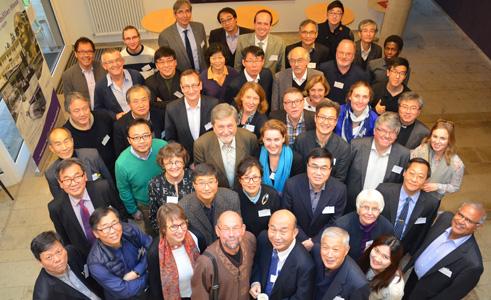Based on an article originally written in German, by Corinna Waltz*
Reflections from the International Conference on Peace and Reunification on the Korean Peninsula in Arnoldshain, Germany
“This is an important place for the struggle for peace and reunification on the Korean peninsula,” said Rev. Ulrike Scherf, vice president of the Protestant Church in Hesse and Nassau (EKHN) during her welcome address on 3 Dec. in Arnoldshain. Already in 2004 and 2008, two other important international consultations with participants from North and South Korea took place at the Martin-Niemöller-Haus, the meeting center of the EKHN. The EKHN also arranged a meeting of Christians from North and South Korea during the international book fair in Frankfurt in 2005.
The International Conference for Peace and Reunification on the Korean Peninsula took place 3-6 December. Besides the about 60 participants from South Korea, England, Canada, Scotland, Germany, the US and Switzerland, North Korean delegates from the Korean Christian Federation were also invited. “In cooperation with other ecumenical bodies, the EKHN is committed to strengthen, support and accompany the process of reconciliation between North and South Korea,” said Scherf.
Though the delegates from North Korea were not able to participate in the conference, their perspective was consistently considered during all discussions and presentations. Many of the participants have already been to North Korea at least once. Carolin Braatz, for example, visited the isolated country as a tourist. “It’s not just grey and rainy,” she says during her presentation. “Yes, there is sun in North Korea.”
During her trip, she realized that one travels with many prejudices and stereotypes in the head when going to the Democratic People's Republic of Korea, as North Korea is called officially. Her advice: “Don’t trust anybody, not even yourself. As you never know if what you are meant to believe is actually true and real.” Even though she returned with many unanswered questions, Braatz is convinced: It is good and important to visit North Korea.
More than a “black-and-white” reality
Peter Prove, director of the World Council of Churches (WCC) Commission of the Churches on International Affairs, also observed that there a black-and-white perception when it comes to North Korea. In October, he visited the People’s Republic with a delegation from the Ecumenical Forum for Korea. “Though there are many things that we do not fully understand, we need to reconsider and reevaluate things we thought we knew, and flesh out this black-and-white picture with more colorful nuances,” he emphasized at the conference. For him, the encounter with North Korean Christians was an encounter with brothers and sisters in Christ.
During the visit of the ecumenical delegation, a meeting with the Korean Christian Federation, representing the Christians in North Korea, and the National Council of Churches from South Korea took place. This meeting issued the so-called Pyongyang Appeal, a controversial document. But for Prove, this appeal is a step in the right direction, especially considering the circumstances of its preparation. After all, this was the first ecumenical meeting on Korean soil involving Christians from both North and South Korea.
“Increasing pressure on the North Korean regime is more likely to lead to war than to peace,” he is convinced. “Peace can’t be achieved by bullets, only by mutual encounter.” And peace is exactly what the Korean people on both sides of the 38th parallel are longing for, said Lutz Drescher, East Asia Liaison Secretary of the Evangelical Mission in Solidarity, who also participated in the delegation’s visit to North Korea. “Right now, probably the best thing you can do to improve human rights in North Korea is to work towards calming the situation and decreasing the tension,” Drescher said regarding the controversial passages on human rights in the Pyongyang Appeal. The armistice agreement finally needs to be replaced by a peace treaty, all the participants of the international conference in Arnoldshain agreed.
The German model
The means of reunification on the Korean peninsula and what there is to learn from the German reunification is a matter of dispute among scholars and the governments of both Koreas, explains Professor Han Unsuk from the university in Tübingen, Germany. Nevertheless, he is convinced that the Korean people need to learn from the experiences of Germany beyond the boundaries of political interests. “And we also need to cooperate across political party lines for peace and reunification on the Korean peninsula,” he emphasized. “That we learn from Germany does not mean that we are looking for a master key we can adopt for our situation.”
Prior the conference in Arnoldshain, the German model for reunification was also a point for discussion when the international guests visited Berlin. In the German capital they met the head of Department for Ecumenical Relations and Ministries Abroad of the Evangelical Church in Germany (EKD), Bishop Petra Bosse-Huber. Asked what should have been done differently during the German reunification process, she responded: “We should have been more humble and we should have listened more carefully to what the people from the eastern part had to say.” To bear in mind both sides – a big task for the people in North and South Korea.
Read also:
Ecumenical forum delegation convenes for first time on Korean peninsula to discuss peace, reconciliation (WCC press release of 13 November)
"The most mysterious country in the world" (Evangelical Mission in Solidarity press release of 15 November)
Pilgrimage of Justice and Peace
Commission of the Churches on International Affairs
* Corinna Waltz is head of the department of medicine at the Evangelical Mission in Solidarity (EMS).







